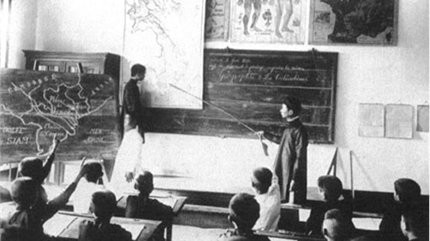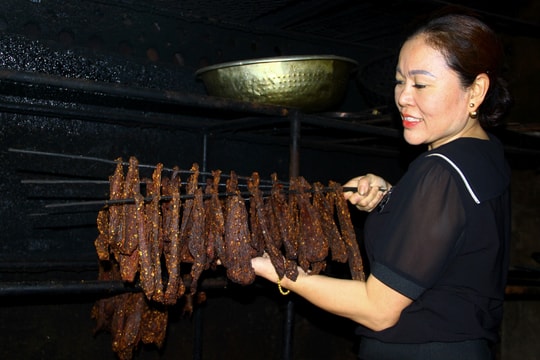Two death sentences for exam editing in Vietnamese history
In feudal times, editing exam papers was a very serious crime. Offenders could be executed, dismissed from office, or punished with caning depending on the severity.
Throughout history, the royal court has placed great importance on examinations and organized them seriously. Typically, in the Royal Examination, the king himself created the questions and graded the exams to select the highest scorers. Anyone who violated the regulations was severely punished, with light punishments including demotion and heavy punishments including execution.
 |
Doctor lost his life because of exam cheating
Ngo Sach Tuan (1648-1697), from Tam Son commune, Dong Ngan district (now Tam Son commune, Tu Son town, Bac Ninh). He was born into a family of scholars with the highest reputation at that time, with his father and older brother both passing the doctoral exams and becoming high-ranking officials in the court.
At the age of 29 (1676), during the reign of King Le Hy Tong, Ngo Sach Tuan passed the doctoral exam and became an official of the Ministry of Justice.
Although he was a great mandarin of his time, Ngo Sach Tuan finally met a tragic end for arbitrarily editing the exam papers of candidates in the 1694 Confucian examination. With this sentence, Ngo Sach Tuan not only lost his life but also left a bad reputation for all eternity.
According to the Complete Annals of Vietnam, at that time, Ngo Sach Tuan was assigned by the royal court to hold the position of Deputy Chief Examiner of Thanh Hoa Examination School (Thanh Hoa). Before leaving, he went to see the Minister of Justice, Le Hy. Le Hy then showed Ngo Sach Tuan the shape of the paper bindings of his children's examination books and asked for help.
Having had a grudge against Le Hy in the past, Ngo Sach Tuan also wanted to take this opportunity to clear up the grudge, so he accepted. Previously, Ngo Sach Tuan denounced Le Hy to the court for secretly bringing his incompetent son and student into the government, but because there was not enough evidence to convict Le Hy, Ngo Sach Tuan was demoted.
After grading the papers, he saw that Le Hy's children's test papers were not ranked as passing, but because he wanted to take this opportunity to erase the grudge with Le Hy, Ngo Sach Tuan took Le Hy's children's test papers and gave them to the examiners, telling them to approve them as passing.
The Deputy Censor-in-Chief of this examination, Ngo Hai, knew about it and swore to Ngo Sach Tuan to keep it a secret, but was discovered by the Tham Chinh Phan Tu Cuong and reported it to the court. Ngo Sach Tuan was sentenced to death by hanging, Ngo Hai was dismissed from his position, the examiners and reviewers were all punished, and Phan Tu Cuong was promoted to the position of Thiem Do Censor-in-Chief.
Although Ngo Sach Tuan was severely punished, this case still did not satisfy posterity, because Le Hy and his son were not punished.
Evaluating this case, the National History Institute of the Nguyen Dynasty stated, "Le Hy was the Prime Minister of a country, yet he entrusted his son to the official in charge of grading exams, and Ngo Sach Tuan flattered the high-ranking official to whom he had entrusted him. If we consider the law of the country, the crimes of both of them are the same, yet only Ngo Sach Tuan was punished, while no one questioned Le Hy and his son. How can this be called the law of the country anymore?"
Cao Ba Quat and the exam correction case that shocked history
Cao Ba Quat (?- 1855), courtesy name Chu Than, pen name Man Hien, was born in Phu Thi village, Gia Lam district, Bac Ninh province (now Quyet Chien commune, Gia Lam district, Hanoi).
In 1831, under the reign of King Minh Mang, Cao Ba Quat passed the regional examinations and became the second best at the Hanoi examination school. In 1841, under the reign of King Thieu Tri, when a Bac Ninh provincial official recommended him, Cao Ba Quat was summoned to the capital Hue to work as a Hanh Tau in the Ministry of Rites.
Although he was an honest and upright mandarin, Cao Ba Quat almost lost his life for the crime of altering exam papers.
According to Dai Nam Thuc Luc, in August 1841, Cao Ba Quat was appointed as a preliminary examiner for the Thua Thien examination. Seeing that some of the papers were good but had some violations of school rules, he discussed with his colleague Phan Thoi Nha to mix vermilion with lamp soot and revise 24 papers.
When the incident was discovered, the Ministry of Rites and the Censorate investigated, Cao Ba Quat admitted everything, "I see that the articles were written by the writers, but no one entrusted or instructed them to do so." The verdict was presented to the king, Cao Ba Quat and Phan Thoi Nha were sentenced to death. Nguyen Van Sieu was sentenced to be whipped and exiled. Chief examiner Bui Quy and examiners Phan Van Nha and Truong Hao Hop were demoted.
Later, understanding Cao Ba Quat's feelings, King Thieu Tri ordered to pardon him from the death penalty with the verdict that "choosing talented people is a solemn ceremony, Quat dared to do such illegal acts, it is worthy to be sentenced to a heavy crime. But I think it was due to stupidity that he did it, and there were no other circumstances, so the death penalty can be pardoned...".
Thanks to that, Cao Ba Quat's sentence was reduced from "beheading" (immediate execution) to "imprisoning and executing later". Finally, he was imprisoned.
After nearly 3 years in prison, in 1843, he and Dao Tri Phu went on a business trip to Indonesia to atone for their sins. After returning from the trip, he was allowed to return to the Academy to take care of collecting and organizing documents.







.png)

